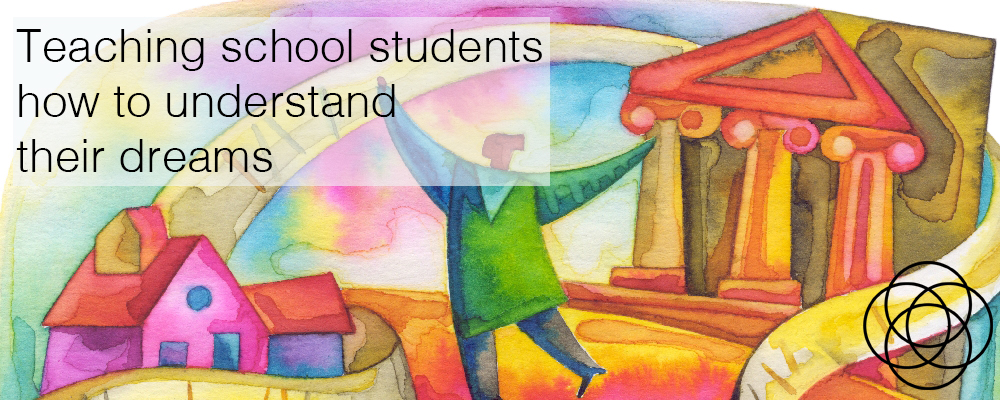What did you learn about dreams and nightmares when you were at school? Nothing, I’ll bet. Can you remember some of the dreams that puzzled, worried, or frightened you as a young child and as a young adult? Did you talk about them? Was anyone able to help ease your mind, and give you practical tips on how to look into your dreams for clues about how to better handle life’s challenges?
I wish I had known, as a child and later as a young adult, what I know now about dreams. I would have learned how to recognise and deal with the feeling pictured in my childhood recurring nightmare of packs of wolves blocking my path, ready to devour me. I would have learned how to address the situation reflected by my dreams of jumping into a swimming pool for fun only for all the water to instantly drain away. I would have gained confidence from my dreams of being able to see exciting perspectives that other people couldn’t see, and as a young adult the insight I would have gained from my dream of being on an endless staircase that eternally doubled back on itself would have given me a way to create quicker, smarter outcomes than I was accustomed to experiencing. The way I felt about myself and my life, and the way I handled my life, would have been so much better so much sooner.
I received an email earlier this month from Judith, a keen follower of The Dream Show, saying:
“I woke up this morning and thought that there should be a class in high school or college where they teach the basic skills to understand one’s own dreams, or at very least, not to misunderstand them. And then I thought I should share it with you. I guess I am at a point where I acknowledge that understanding my dreams makes a huge difference in my life, a vital difference, and I wish everybody had it too.”
It’s something I’ve occasionally considered, given that we all dream every night, and most of us remember many of our dreams, especially the frightening ones. I asked Judith if I could share her waking thought with you on this blog. I thought we might start painting a picture of how taking dreams into our school systems might look, and seek your thoughts and suggestions. Maybe we can take some steps toward making it happen.
So how would it look, at kindergarten, junior school, high school, and college?
I published some tips on the internet back in 2005 for parents of children suffering nightmares, which you can now hear on Episode 109 The Dream Show. While those ideas were designed for parents, some could be adapted and extended into a kindergarten class situation.
Let’s take a general approach, given that you – readers of this blog – live all over the world and experience many different education systems.
Might our picture be of specialists contracted to come into schools and colleges to teach courses on dreams? Or might we picture specialists developing courses and programs for teachers to use in the classroom? May we be bold enough to envision dreams being incorporated into standard curricula from kindergarten through to the end of high school?
Or might we picture offering specialist training in dreams to school counsellors and guidance staff, either to assist them in their work with individual students or to give them the tools to work with small groups?
Or might we picture developing books, videos, games, apps, that individual teachers might choose to introduce into creative studies, personal development, reading, drama, social studies, relationship courses, or student research projects?
I can see, in my mind’s eye, writing a book about dreams for children and young adults. I can see an outline of the content. I can imagine the stories I might write, the games and puzzles designed to teach, the practical tips to follow, the gentle imparting of how to grow and flow with the big lessons of life: coping with change, building resilience, facing fears and difficult emotions, realising potential, making decisions, developing kindness and compassion, and so much more. It would be a lot of fun to create, but maybe some of the other ideas I’ve suggested are better – and would travel further – in the long run.
Long before I began researching dreams, I worked for two years as a high school science and biology teacher, and spent a term as acting head of biology. It was a very long time ago, and I understand from friends and clients who are teachers today that the paperwork side of things is more complex and time-consuming than ever before, and that the work needed to introduce new courses – let alone new subjects – is somewhat Herculean, but how might we nevertheless begin?
In her email, Judith mentioned helping students “at very least, not to misunderstand (their dreams)”, and I think this is a key point. As a dream analyst I see the heartbreak and high anxiety that can result from misunderstanding one’s dreams, particularly from taking them literally.
I have talked with people who believed they had dreamed the dates of their deaths – and lived their lives (with compromise) taking this into account. (When I show them how to relate the dream to their life, they recognise the symbolism, and, in due time, the anticipated death date passes proving that these dreams are not to be taken literally.)
I have talked with people who have wasted years searching for a soul-mate with the precise physical characteristics they have seen in their dreams – and missed recognising the person who would have been a great match. These dreams are symbolic, and, once understood, can be extremely helpful in identifying and encouraging a dreamer’s potential.
I have talked with people who have believed their dreams of their partners cheating on them (and taken action or withdrawn emotionally), and I have talked with people who have been so shocked by their sexual or violent actions in their dreams that they have mistakenly believed they must be wired for and capable of such acts in waking life. Dreams of cheating, sex, and violence, are normal and common and not what they seem. Once understood, they can be extremely beneficial in helping the dreamer to develop healthy skills for successfully navigating life’s challenges.
I have seen so many people suffer so much pain from taking their dreams literally.
Let’s help make a change. Let’s begin with education early in life.
What do you suggest?
You might also enjoy


9 comments on “Teaching school students how to understand their dreams”